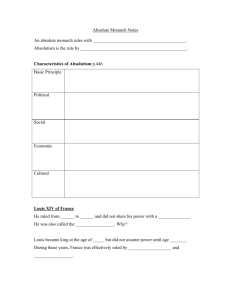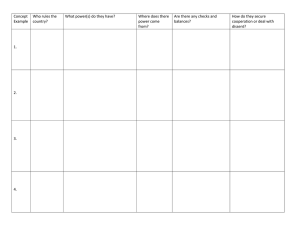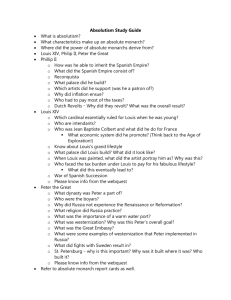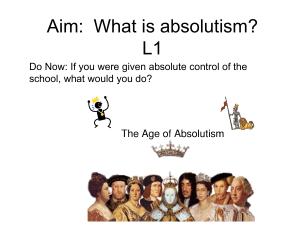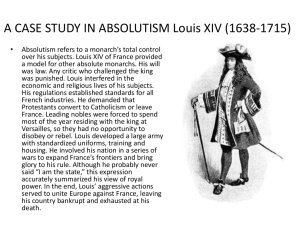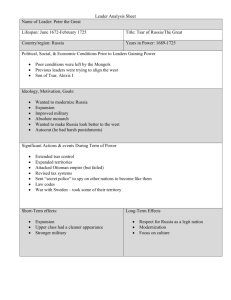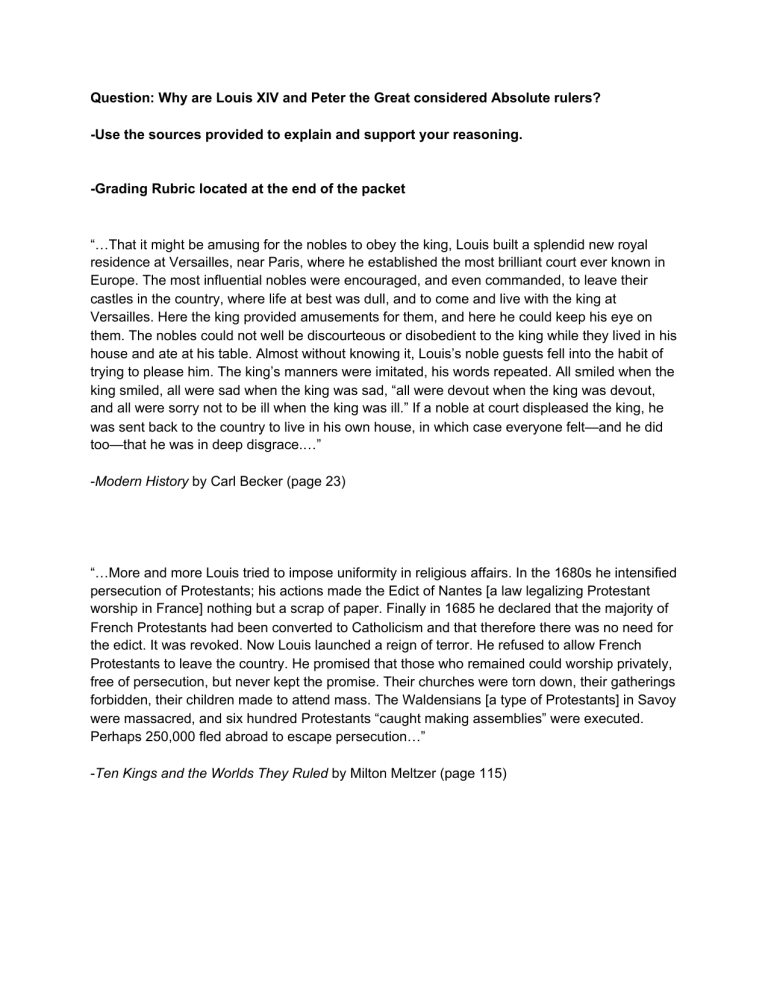
Question: Why are Louis XIV and Peter the Great considered Absolute rulers? -Use the sources provided to explain and support your reasoning. -Grading Rubric located at the end of the packet “…That it might be amusing for the nobles to obey the king, Louis built a splendid new royal residence at Versailles, near Paris, where he established the most brilliant court ever known in Europe. The most influential nobles were encouraged, and even commanded, to leave their castles in the country, where life at best was dull, and to come and live with the king at Versailles. Here the king provided amusements for them, and here he could keep his eye on them. The nobles could not well be discourteous or disobedient to the king while they lived in his house and ate at his table. Almost without knowing it, Louis’s noble guests fell into the habit of trying to please him. The king’s manners were imitated, his words repeated. All smiled when the king smiled, all were sad when the king was sad, “all were devout when the king was devout, and all were sorry not to be ill when the king was ill.” If a noble at court displeased the king, he was sent back to the country to live in his own house, in which case everyone felt—and he did too—that he was in deep disgrace.…” -Modern History by Carl Becker (page 23) “…More and more Louis tried to impose uniformity in religious affairs. In the 1680s he intensified persecution of Protestants; his actions made the Edict of Nantes [a law legalizing Protestant worship in France] nothing but a scrap of paper. Finally in 1685 he declared that the majority of French Protestants had been converted to Catholicism and that therefore there was no need for the edict. It was revoked. Now Louis launched a reign of terror. He refused to allow French Protestants to leave the country. He promised that those who remained could worship privately, free of persecution, but never kept the promise. Their churches were torn down, their gatherings forbidden, their children made to attend mass. The Waldensians [a type of Protestants] in Savoy were massacred, and six hundred Protestants “caught making assemblies” were executed. Perhaps 250,000 fled abroad to escape persecution…” -Ten Kings and the Worlds They Ruled by Milton Meltzer (page 115) “…Recent studies have concluded that the economic damage done to France by the Huguenot [French Protestants] emigration has been overrated, it being only one element in the larger damage caused by the wars. Of the political damage, however, there is no question.” -The Sun King by Barbara Tuchman (page 77) “It was a very rare thing in Russia before this present Czar’s time to have found any man, even among the highest and the most learned of the clergy, to have understood any language but their own… ...this ignorance is not so much to be wondered at when it is considered that they [Russian nobles] neither suffered [allowed] their sons to travel, nor was there ever any university in the country, or considerable school of any learning, till this Tsar’s time… …The Tsar…gave orders that all his boyars [nobles] and people whatsoever that came near his court and that were in his pay should…equip themselves with handsome cloths made after English fashion.” -The State of Russia under the Present Czar by John Perry (page 9) “…On August 8, 1700, Peter made his historic decision to declare war on Sweden, in order to open a maritime route from Russia to the West by the conquest of the Baltic littoral [coastal region]. He had secured the collaboration of Poland and Denmark, but his alliance with these two rivals of Sweden was to prove ineffectual. With nothing to rely on but his own forces, Peter was defeated at Narva by the valiant Swedish King, Charles XII. Refusing to be discouraged by this defeat, Peter raised and equipped new armies; he put immense effort into creating a good artillery; he worked with his own hands on the construction of the frigates [ships] that were to give him mastery of the Baltic. Then his disciplined and well-trained regiments seized the mouth of the Neva River and entrenched themselves along the coveted [desired] littoral. On June 27, 1709, in a battle at Poltava, he put his great adversary, Charles XII, to flight…” -A Window on the West by Christopher Hibbert (page 43) “…In 1722, the establishment of the Table of Ranks brought to its logical conclusion a process that had been evolving for three centuries. It imposed obligatory lifelong state service on all ranks of the nobility. It established fourteen equivalent grades in the military, naval, and civil service and required that even princes of the most exalted families should begin at the lowest grade and work their way up the ladder. The Table of Ranks offered the privileges of nobility to anyone who performed state service and made service to the state the principal basis for privilege…” -Peter, The Revolutionary Tsar by Peter Brock (page 200) “…How great an effect did Peter have upon Russia? When he came to the throne, Russia was an insignificant state. He made it into a great power feared by all. At his accession [assumption of the throne] Russia had no armed forces except for the inefficient and untrustworthy Streltsy [hereditary military units]. When he died, there was a professional army of 210,000 men. He created a navy out of nothing, leaving behind him a fleet of forty-eight ships-of-the-line and many smaller vessels… Peter signally [noticeably] failed to create the large, thriving middle class that Russia needed. In spite of the most strenuous efforts, Russia’s commerce and industry remained dependent upon the Czar, so that when he died, there were not enough wealthy, far-sighted traders and industrialists to develop what he had begun. This lack of private initiative and enterprise was to remain one of Russia’s greatest social weaknesses until the Communist Revolution of 1917…” -Peter the Great, by Michael Gibson (page 347) “For all men in general this observation may be made: they are ungrateful, fickle, and deceitful, eager to avoid dangers, and avid for gain, and while you are useful to them they are all with you, but when it [danger] approaches they turn on you. Any prince, trusting only in their works and having no other preparations made, will fall to ruin, for friendships that are bought at a price and not by greatness and nobility of soul are paid for indeed, but they are not owned and cannot be called upon in time of need. Men have less hesitation in offending a man who is loved than one who is feared, for love is held by a bond of obligation which, as men are wicked, is broken whenever personal advantage suggests it, but fear is accompanied by the dread of punishment, which never relaxes.” -The Prince by Niccolo Machiavelli (page 4) “The head alone has the right to deliberate and decide, and the functions of all the other members consist only in carrying out the commands given to them… The more you grant… [to the assembled people], the more it claims.. The interest of the state must come first.” -Proclamation of 1660 by Louis XIV (page 1) Rubric: ● ● ● ● Introduction (10 points) ○ Background information ○ Thesis Statement (Makes an argument. Is detailed. Answers the entire essay question. Last one or two sentences in the paragraph) Body (60 points) ○ Paragraphs are organized by “topics” or “themes” ○ Each paragraph begins with a “topic sentence” ○ Uses at least seven sources ○ Describes the sources ○ Analyzes the sources(uses the sources to answer the essay question/thesis statement) ○ Provides relevant vocabulary ○ Explains information Citing Documents in Body paragraphs (20points) ○ Documents are cited properly in the essay ■ First time using a source: provide title and author and put page number in parentheses after cited sentence ■ Any time after: Put author's last name and page number in parentheses after the cited sentence Conclusion and Essay Structure(10 points) ○ Summarize the essay in Conclusion ○ Restate thesis statement in Conclusion ○ Minimal spelling errors ○ Professional/formal writing (an essay is not a text message/snapchat/facebook post to a friend) ○ 3-4 pages double spaced ○ Paragraph length: 7-9 sentences ○ 1 inch margins ○ Times New Roman 12pt font Total: -----------------------/100points

